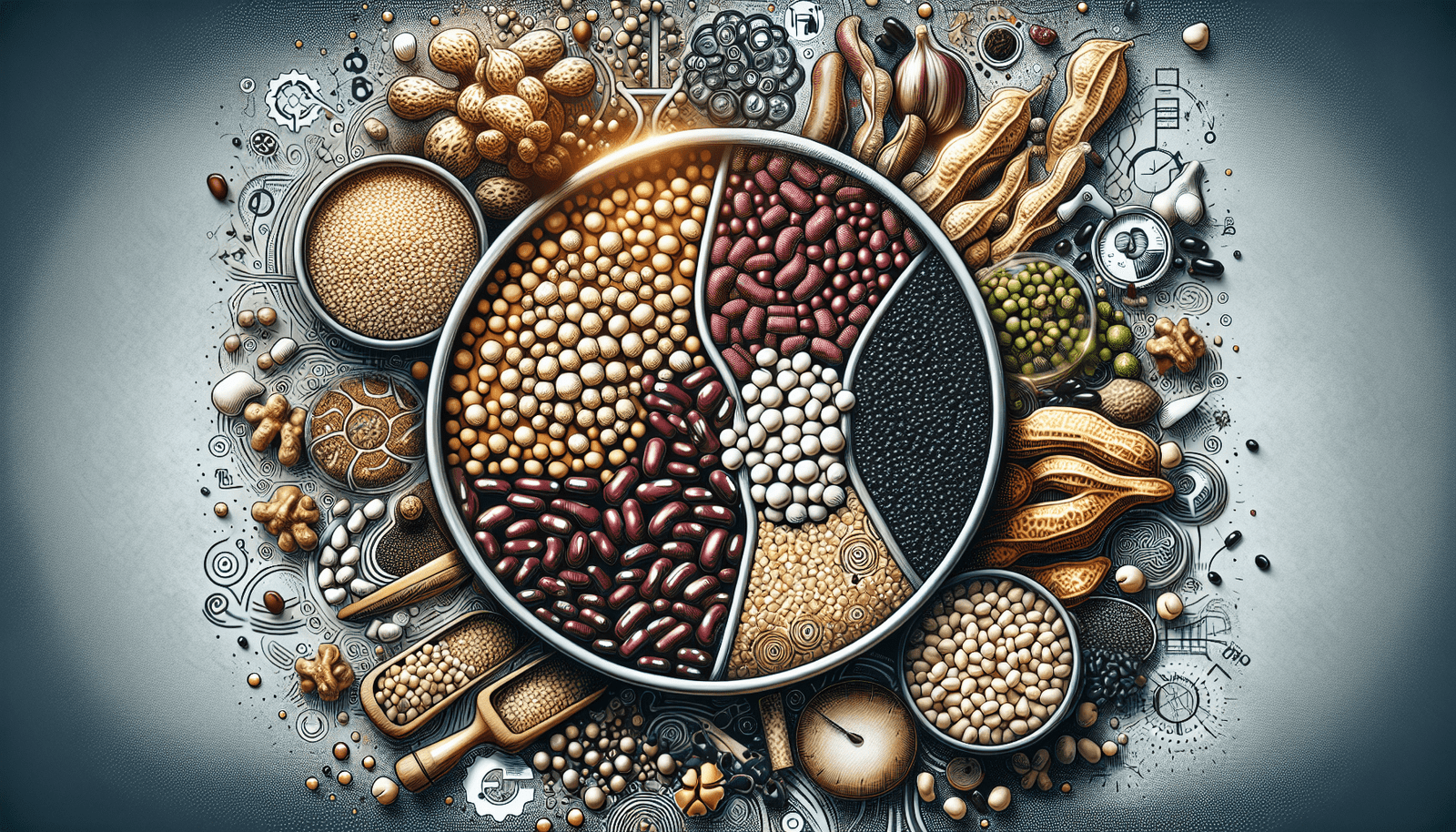Legumes, those tiny powerhouses of nutrition, not only provide a delicious addition to your meals but also play a vital role in supporting your overall digestive health. With their high fiber content, legumes act as natural cleansers for your digestive system, ensuring that waste is efficiently eliminated and thereby reducing the risk of constipation. Additionally, these mighty legumes contain prebiotics, which act as food for the good bacteria in your gut, promoting a healthy balance of bacteria and aiding in the digestion and absorption of nutrients. So, next time you enjoy a hearty bowl of lentil soup or a savory plate of chickpea curry, remember that your taste buds aren’t the only ones thanking you – your digestive system is too!

Improved gut health
Legumes, such as beans, lentils, and chickpeas, are rich in dietary fiber, making them a great addition to your diet for improved gut health. Fiber is essential for maintaining a healthy digestive system, as it promotes regular bowel movements and supports the growth of beneficial gut bacteria.
Rich in dietary fiber
Legumes are among the highest sources of dietary fiber, with one cup of cooked beans providing around 15 to 16 grams of fiber. This high fiber content helps to regulate digestion and prevent issues like constipation.
Promote the growth of beneficial gut bacteria
The fiber found in legumes acts as fuel for the beneficial bacteria in your gut. These bacteria play a crucial role in maintaining a healthy digestive system. By consuming legumes regularly, you can support the growth of these beneficial gut bacteria, which in turn can improve your overall gut health.
Prevent constipation
One of the key benefits of legumes for digestive health is their ability to prevent constipation. This is primarily due to their high insoluble fiber content.
High in insoluble fiber
Insoluble fiber adds bulk to your stool and helps it move through the digestive system more effectively. This prevents constipation and promotes regular bowel movements. Legumes, with their high content of insoluble fiber, provide the necessary roughage to keep your digestive system functioning smoothly.
Facilitate regular bowel movements
By adding legumes to your diet, you can ensure that you keep a regular bowel movement schedule. The insoluble fiber in legumes adds bulk to your stool, increasing the frequency and ease of bowel movements. This contributes to overall digestive health and prevents the discomfort of constipation.
Manage weight
For those looking to manage their weight, legumes can be an excellent addition to their diet. They provide satiety and support weight loss efforts.
Provide satiety
Legumes are packed with fiber and protein, both of which contribute to a feeling of fullness and satisfaction. When you consume legumes, you tend to feel fuller for longer, reducing the likelihood of overeating. This can be particularly helpful for managing weight and preventing unhealthy snacking between meals.
Support weight loss
In addition to providing satiety, legumes can support weight loss efforts due to their nutrient density. Legumes are low in calories but high in essential nutrients like vitamins, minerals, and antioxidants. By incorporating legumes into your meals, you can enjoy nutritious, filling options while managing your weight effectively.
Reduce risk of colon cancer
Consuming legumes regularly can significantly reduce the risk of developing colon cancer. This is due to their high content of antioxidants and phytochemicals.
Contain antioxidants and phytochemicals
Antioxidants and phytochemicals are compounds known for their powerful health benefits, including cancer prevention. Legumes, such as black beans and kidney beans, contain these compounds in abundance. Regular consumption of legumes can help protect your colon cells from damage and reduce the risk of developing colon cancer.
Promote a healthy colon environment
The antioxidants and phytochemicals present in legumes also help create a healthy environment in your colon. These compounds neutralize harmful free radicals and reduce inflammation, which can contribute to a healthy colon. By including legumes in your diet, you can support a healthy digestive system and lower your risk of colon cancer.

Boost nutrient absorption
Legumes can enhance the absorption of essential nutrients in your body, ensuring that you receive maximum benefits from the food you consume.
Enhance mineral absorption
Legumes contain compounds that enhance the absorption of minerals like iron, zinc, and calcium. These minerals are vital for various bodily functions, ranging from maintaining strong bones to supporting a healthy immune system. By including legumes in your diet, you can optimize the absorption of these essential minerals and promote overall health.
Optimize nutrient utilization
Not only do legumes enhance mineral absorption, but they also help optimize the utilization of other nutrients. The high fiber content in legumes slows down the digestion process, allowing your body to extract and absorb nutrients more efficiently. This ensures that you receive the maximum nutritional benefits from the food you consume.
Regulate blood sugar levels
Legumes are an excellent addition to a balanced diet for those looking to regulate their blood sugar levels. Their low glycemic index and ability to slow down carbohydrate digestion make them a healthy choice for individuals with diabetes or those aiming to prevent blood sugar spikes.
Low glycemic index
The glycemic index (GI) measures how quickly a particular food raises blood sugar levels. Legumes, with their low GI, have a minimal impact on blood sugar levels. This makes them an ideal choice for individuals with diabetes or those looking to maintain stable blood sugar levels throughout the day.
Slow carbohydrate digestion
Legumes have a high fiber and protein content, which helps slow down the digestion process. When you consume legumes, the carbohydrates in them are digested and released into the bloodstream at a slower rate. This slow release prevents sudden spikes in blood sugar levels, promoting stable glucose levels and overall health.
Support heart health
Including legumes in your diet can significantly contribute to supporting heart health. They have been shown to lower cholesterol levels and maintain healthy blood pressure, both of which play a crucial role in reducing the risk of heart disease.
Lower cholesterol levels
Legumes, especially beans and lentils, are rich in soluble fiber. This type of fiber helps lower LDL cholesterol levels, often referred to as “bad” cholesterol. By regularly incorporating legumes into your meals, you can promote healthy cholesterol levels and reduce the risk of heart disease.
Maintain healthy blood pressure
Legumes are also a great source of potassium, a mineral that helps regulate blood pressure. Potassium works by counteracting the negative effects of sodium, a mineral that can contribute to high blood pressure. By consuming legumes, you can ensure a healthy balance of essential minerals and support optimal blood pressure levels.
Enhance digestive enzyme activity
Legumes contain beneficial enzymes that aid in proper digestion and nutrient breakdown. Including legumes in your diet can help enhance the activity of these enzymes, promoting efficient digestion and absorption of nutrients.
Provide beneficial enzymes
Legumes contain enzymes such as amylase, protease, and lipase, which are involved in breaking down carbohydrates, proteins, and fats, respectively. By consuming legumes, you can provide your digestive system with these beneficial enzymes, ensuring proper digestion and nutrient breakdown.
Aid in proper digestion and nutrient breakdown
By enhancing digestive enzyme activity, legumes help ensure that the nutrients from the food you consume are effectively broken down and absorbed by your body. Proper digestion is essential for overall health and can prevent digestive issues such as bloating, gas, and indigestion. Including legumes in your meals can support optimal digestive function and nutrient utilization.
Reduce inflammation
Inflammation in the digestive system can cause discomfort and contribute to various digestive disorders. Legumes have anti-inflammatory properties that can alleviate digestive discomfort and promote a healthy gut environment.
Contain anti-inflammatory compounds
Legumes, particularly soybeans and chickpeas, contain compounds with anti-inflammatory properties. These compounds help reduce inflammation in the digestive system, providing relief from conditions such as irritable bowel syndrome (IBS) and inflammatory bowel disease (IBD).
Alleviate digestive discomfort
The anti-inflammatory properties of legumes can soothe and alleviate digestive discomfort. Whether you experience bloating, cramping, or general gastrointestinal discomfort, incorporating legumes into your diet can provide relief and promote a healthier gut.
Prevent digestive disorders
Legumes offer protection against common digestive disorders and alleviate symptoms in those already affected. They can help prevent diverticulosis and alleviate symptoms of irritable bowel syndrome (IBS).
Protect against diverticulosis
Diverticulosis is a condition characterized by the formation of small pouches in the colon wall. These pouches can become inflamed or infected, leading to diverticulitis. By incorporating legumes into your diet, you can help prevent diverticulosis and maintain a healthy colon.
Alleviate symptoms of irritable bowel syndrome
Legumes, with their high fiber content, can help alleviate symptoms of irritable bowel syndrome (IBS). IBS symptoms often include abdominal pain, bloating, and irregular bowel movements. Including legumes in your diet can provide the necessary fiber to regulate bowel movements and reduce discomfort associated with IBS.
In conclusion, legumes offer numerous benefits for overall digestive health. From improving gut health to reducing the risk of colon cancer and supporting heart health, legumes are a versatile and nutritious addition to any diet. By incorporating legumes regularly, you can enjoy the advantages they provide in terms of weight management, nutrient absorption, and inflammation reduction. So, consider including legumes like beans, lentils, and chickpeas into your meals, and experience the positive impact they can have on your digestive system.

